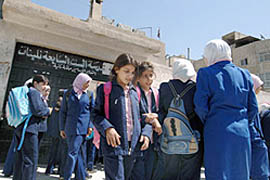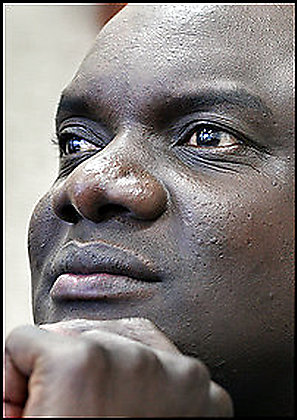
I haven’t posted in a while, so I thought this would be a good post to get back in the swing of things.
One would think that by now people in the U.S. would be experts regarding Iraq. Since George W. Bush talks so much about “bringing freedom” to the Iraqis, saying things like “the safety of America depends on the outcome of the battle in the streets of Baghdad”, I assume all law-abiding, patriotic citizens should at least know something about Iraq’s culture, its geography, languages spoken, not to mention everything about the daily struggles of the Iraqis. Yeah right, and first thing tomorrow morning, I’m buying a Jaguar for myself and a Porsche for my wife.
It is so incredibly frustrating that the average American is completely ignorant of the current human crisis and refugee situation in Iraq. If this were the 1930’s, with no TV, print, or internet, I would understand, but nowadays information is at the tip of the fingertips, one search engine away.
Take this recent article from WireTap Magazine:
Child prostitution is an increasingly widespread phenomenon in Damascus. Out of economic desperation, Iraqi refugee women and girls are forced into these roles. Frequently, women who have lost their husbands or girls who have lost their fathers resort to prostitution to support their families. And sometimes families that have no other financial resources sell their daughters into the sex industry. It is a tragic and horrifying reality.
There are no official figures as to how many of the Iraqi refugees work as prostitutes. But Hana Ibrahim, founder of the Iraqi women’s group Women’s Will, told The Independent that she puts the figure at 50,000. No one knows how many of the prostitutes are children.
Take a guess if this has EVER been discussed, or at least mentioned, in the mainstream media, with the seriousness this deserves. You certainly won’t hear it from the likes of George W. Bush or Dick Cheney. They just don’t to talk about the problems, and even if they do, they certainly won’t address the causes of it:
The increased trafficking and prostitution is yet another result of the U.S. occupation of Iraq. There are roughly 1.5 million Iraqi refugees in Syria, perhaps 2 million within the Middle East. UNHCR estimates that 50,000 Iraqi refugees arrive in Syria each month. This situation represents the largest refugee crisis in the Middle East since 1948 and is currently the fastest growing refugee crisis in the world. Syria has been accepting more refugees without visas than any other country in the world. On Sept. 11, however, the Syrian government announced new visa restrictions that will sharply decrease the numbers of Iraqis wishing to enter Syria.
50,000 Iraqi refugees each month. That’s over half a million last year just to Syria alone. Syria has done a lot for Iraqi refugees, yet you really don’t hear much about it. What you do hear is that Syria might get a can of good ol’ butt whoopin’, shock-and-awe style, if it doesn’t do what the U.S. wants. If George W. Bush really cares that much for Iraq’s people, then he must be bending over backwards helping Iraqis, right? Wrong:
[…]In a July 2007 press statement, Malcolm Smart, director of Amnesty International’s Middle East and North Africa program, states, “The Syrian authorities have responded very positively to the Iraqis’ needs, but they and the Jordanian authorities should not be left to bear the weight of this crisis alone.” He went on to scold nations who had previously committed to providing financial assistance but had yet to cough up the funds.
But a lack of money is not the only problem. Refugees International underscores that offers from the international community to resettle Iraqi refugees have also been scarce. For example, the United States initially promised it would accept 7,000 Iraqi refugees by October of this year, yet, to date, has accepted only 133. Sweden, which had allowed thousands of Iraqis to resettle, has recently closed its borders to them. The silence of other nations on this issue is deafening.
7,000 measly visas for Iraqi refugees that are fleeing violence, civil war and ethnic cleansing, and of those only 133 have been accepted. Is this the high standard the U.S. currently has in place for the refugees in the very same fucking country it is “liberating”? I mean, give me a fucking break. It’s not like the U.S. has never helped refugees before. In 1975, President Ford brought to the U.S. 131,000 South Vietnamese that had worked for the Americans.
We can do a lot better. But I digress. The average American, especially those belonging to that elusive “28%” of the population that still backs Bush in whatever fantasy he spits out of his mouth, doesn’t have a clue as to what an average Iraqi refugee has to live with:
According to the UNHCR, Iraqis arrive with three to five months’ worth of savings. Due to a scarcity both of resources and of housing, they live in overcrowded neighborhoods outside of Damascus, such as Jeremana, often cramped seven to a room with few furnishings. Iraqis are not allowed to work in Syria, so when their funds run out, they are unable to support themselves. Consequently, many work illegally. Yet these jobs are difficult to come by and poorly paid, and workers frequently face discrimination. A report published by UNHCR and UNICEF last year states that an estimated 450,000 Iraqis in Syria “face aggravated difficulties” related to their “ambiguous legal and unsustainable income.” As their savings dwindle, the situation of Iraqi refugees is bound to deteriorate further. Sybella Wilkes, the UNHCR Regional public information officer in Damascus, says that “64 percent of the people who have arrived here have run out of savings.”
Bassam Alkadi, of the Syrian Women’s Observatory, agrees that the economic desperation is leading to an increase in prostitution. “The standard of living for Iraqis,” he says “has gone downhill very quickly.”
Yet according to Dubya, freedom is on the march. Sometimes I wish I were more eloquent so I can convey my thoughts and emotions better, but such is not the case here. The Iraqi refugee crisis is something I, along with others that truly give a damn about human rights, have been discussing since before the U.S. invasion of Iraq. One of my main gripes, though, is the hypocrisy that people have towards all of this. They care about the Iraqis, yet don’t want or don’t care to find out what’s really happening. It is all horseshit. Just admit it – this war has nothing to do with WMDs (guess who still believes that nonsense), democracy, or human rights. The average American does not understand or care much about human rights, and neither does Dubya.
Who are you going to believe, me or the president of the United States? Hint: I have been known to be right on occasion.



 Posted by truly.equal
Posted by truly.equal 


